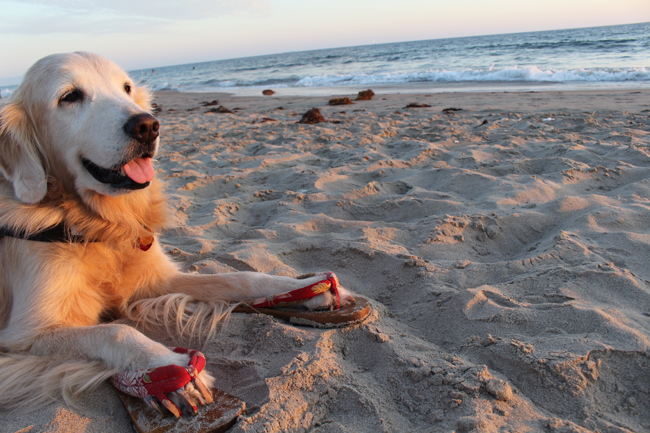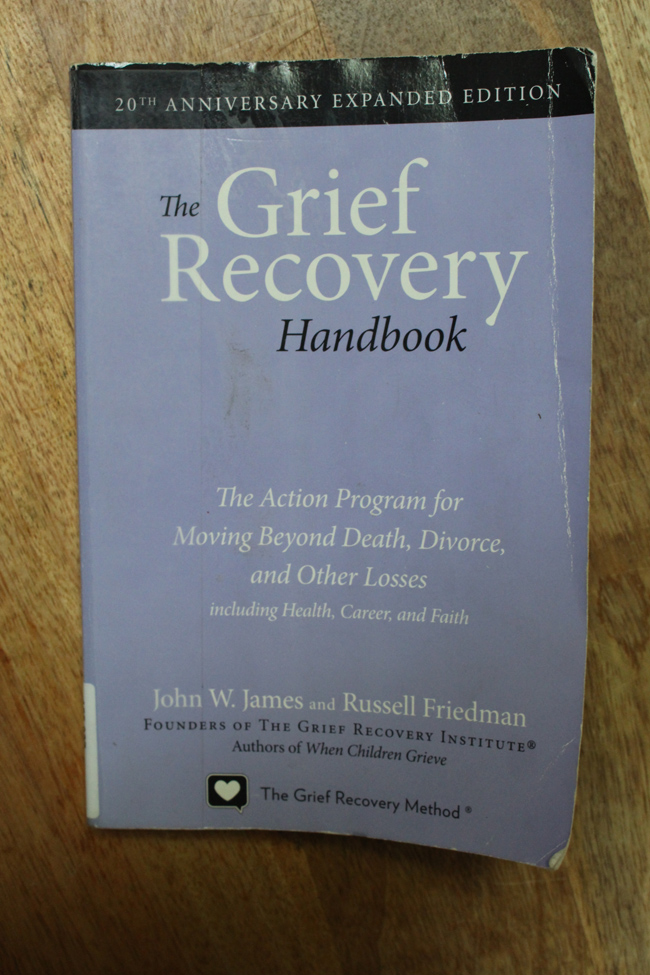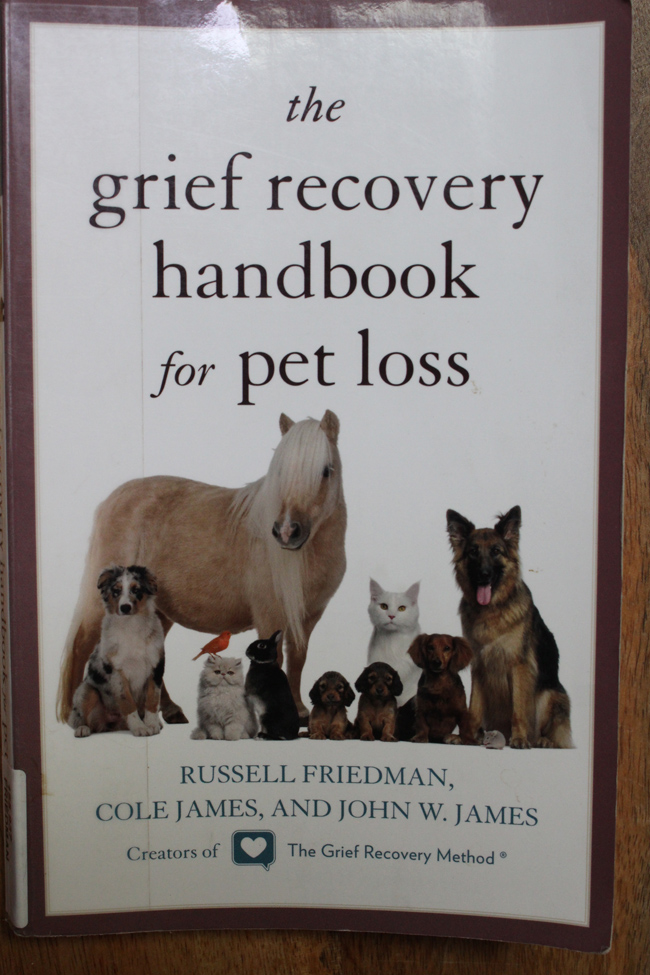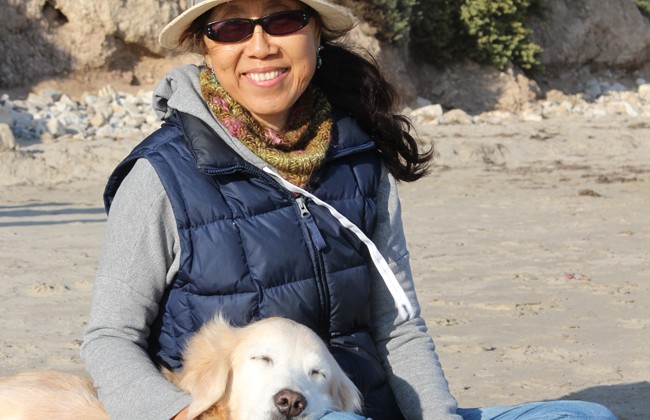If any of you read my blogs about my beloved dog daughter, Kula—who departed last August—you know I was sad and missing her. I took a time to take care of my inner self and also put together Kula’s ceremony on her 49th day, according to Buddhist tradition. I invited many of Kula’s friends and people who loved her. You can read about it here and see a YouTube video of the ceremony here.
I heard that by Buddhist tradition, I must not cry after the 100-day ceremony. I did not think I took the tradition so seriously, but after November 9, Kula’s 100-day ceremony, I not only stopped crying, but I also stopped talking or writing about her. It was not intentional, but Thanksgiving and the holidays were coming, so I must have felt it was not a good time to share my sad feelings with anyone. I kept all the memories of Kula inside of me.

photo: Kula wearing my wood sandals at her favorite place – the beach!
I gradually started to feel numb and did not feel “Sanae.” Sanae is usually excited every morning, motivated about the day, and she is curious. But I had no excited feeling and no motivation or curiosity anymore. I thought it was just holiday blues, which I do feel almost every year. So, I kept doing my usual things—teaching, counseling, taking dogs for walks, and practice my yoga.
About a week before Christmas, Eric got sick (which was unbelievable, because the last time he got sick and took a day off was in 1992 when he first moved to Los Angeles.) He had to go to Utah for his cooking job the day after Christmas, so I took care of him with my best ability. He had to take only one day off from work; he got better and went to Utah. But I was getting a high fever and stayed home alone with the dogs and cats for seven days. I got a little better, so I wrote my final 2016 newsletter to my friends and family. I was hoping to get better soon after I wrote the newsletter. It took another week or so, but I got better and taught cooking classes, did counseling, etc.
In mid-January, we found out we had a flood in our mountain cabin in North Fork, California. It was lots of work for Eric to clean and make trenches, so I cooked and took care of our dogs and cats. Then I got a fever again for one week; it ended but came back again last week. After more than a month, I decided to go get some tests done. My main symptom was a fever of 100–102. I had some sore throat and a little cough, but nothing major—except I was not able to eat my favorite foods, like brown rice, miso soup and twig tea (kukicha). Also, my sleeping pattern had changed. I was able to do most of the housework and things I normally do, except when I had a high fever. But I did not want to socialize much, and I got tired very easily and had no motivation to do music or new or physical things. I just wanted to go see the ocean and be with my dog and cat family. I did not feel like I was depressed (I went through depression before, so I usually notice if I am feeling that way).
It took a while, but I realized I was going through “grief.” I was grieving for Kula! I was thinking about her most of the day. I remembered her with everything I did and everywhere I went since she had been my service dog when I was in a wheelchair.
I knew I was feeling very sad and missing Kula a lot, but I thought I was doing all right. I have sent many dogs and cats to heaven since I was 8 years old. Of course, I was sad and missed each of them, but I was able to process the sadness every time, so I did not think I was going through “grief” for Kula. Also, I still have five other dogs and two cats, so I felt bad missing Kula so much. I told myself that I can’t miss her so much—an excuse not to feel my sadness. That’s how I completely stopped talking about her.
Since finding out that I must be grieving for Kula, I have been reading a book about grief and learning how to process it and find self-support meetings and workshops. The book told me that in order to deal with grief, I need to talk about my sadness and pain and how much I miss Kula—which is a relief because whenever I talk about her, my heart is lifted and open. The book also says, “Sadness and joy are part of your memories.”
What I have learned so far from The Grief Recovery Handbook – John W. James and Russell Friedman

Myths About Grief
Most of us, over the course of our lifetime, have heard at least one of the following statements after a loss:
- Time Heals All Wounds. You may still be grieving after losing someone five, 10 or 20 years ago. Does it hurt any less? Do you miss that person any less? Probably not. For some, the pain may get even worse. Time definitely does not heal all our pain. Yes—I thought after Kula had been departed 100 days, I should be okay.
- Grieve Alone. We have been taught that we are not to burden others with our grief. I felt that way after the suicides of two friends. You don’t want to bother others with your sadness, so you keep it to yourself. In some cases, you reach out to others, but they don’t know what to do to help you. As a result, you feel lost and alone, so you isolate yourself as a way of handling the grief that others can’t. Grieving alone certainly, doesn’t work. Yes—I did not want to bother people, and I just stayed alone.
- Be Strong. If you are the oldest child in your family, you know this one well. If something happens, you have to be the strong one for your younger siblings. You have to suck it up and not show your emotions. Heaven forbid the younger ones to see you crying. What sort of message does that send? Maybe they will think you are weak instead of just plain sad. Trying to be strong just gives the wrong message that you are trying not to be human. Yes—as long as I stayed strong, I was all right.
- Don’t Feel Bad. How many of us have been told as a child not to cry when something bad happened? Rather than expressing our emotions, we were told to hold it in. I think many of the generations before us were never allowed to show their feelings. Men joined the military and were told to check their emotions at the door. Some children have never seen their parents cry. No wonder they grow into adults who can’t deal with their own emotions. Yes—it has been a while, so I should not feel sad.
- Replace the Loss. I am pretty sure most of my generation has heard after a relationship breakup, “Don’t feel bad; there are plenty of fish in the sea.” I’m not sure if that was supposed to make us feel better, but in actuality, it made it worse. It implies that we should not wait and grieve over the loss of the relationship, but instead move on right away and replace the old one with a new one. That can’t be healthy. Maybe that is why so many people have a revolving door in relationships—maybe even two at one time, in case one of them doesn’t work out. No wonder there are so many divorces these days. This one did not fit me.
- Keep Busy. Speaking from experience, I can say I became a workaholic just so I didn’t have to think after the suicides of my two friends. Keep busy. Keep working. Don’t think about it. It’s much easier than facing your grief. In reality, it’s worse, because you don’t end up facing your grief at all. Yes—I thought as long as I kept busy, I was all right.
All relationships are unique—no comparison and no exceptions.
I am also reading The Grief Recovery Handbook for Pet Loss – John W. James, Russell Friedman and John W. James

I started to talk about Kula a little bit again, and I am writing about my feelings and letting some friends know what I am going through, which is helping me.
I went to see the new movie A Dog’s Purpose. I cried a lot and thought about Kula and miss her a lot.
Now I started to talk to Kula once again and using animal communications that I have learned. She supports my feelings and told me “Mommy, I love you and miss you too. Please take all your time, you are all right! I am here for you no matter what.”
I am thinking of trying a support group meeting or taking a workshop to learn more.
If any of you are interested here is their website.
Bach Flower remedy and a homeopathic remedy are also very good to take during grieving period, as well as using essential oil and a healing crystal power stone. I would like to share about it in my next blog.
If you are going through grieving, please share also!
With my love,
Sanae

